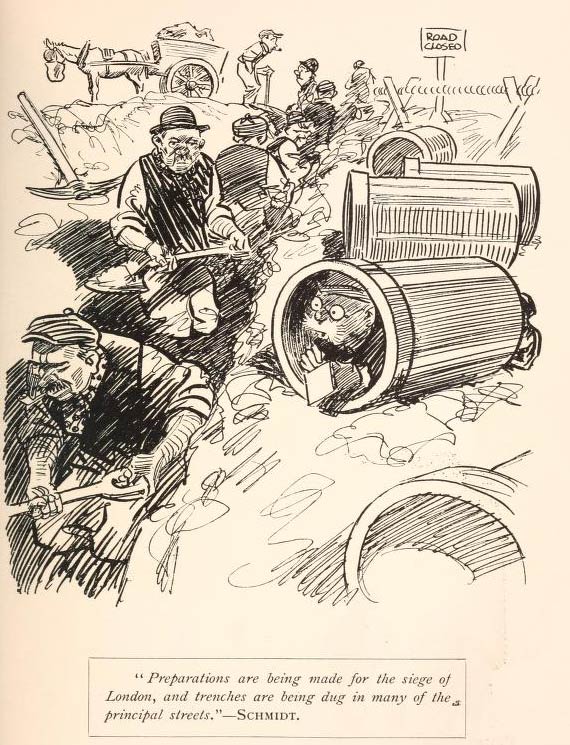'Schmidt the Spy'.
Alfred Leete was an early-20th century British graphic artist and cartoonist, best known for his advertising posters. His most famous contribution to popular culture was the iconic 1914 army recruitment poster, which depicted British Minister of War Lord Horatio Kitchener pointing at the audience to "join your country's army". Lesser known is that during World War I, Leete was also the creator of two text comics, 'Schmidt the Spy' and 'Bosch the Soldier'. Both were Allied propaganda ridiculing the German army.
Early life and career
Alfred Ambrose Chew Leete was born in 1882 at Thorpe Achurch, Northamptonshire. He studied at the School of Science and Art in Weston-super-Mare. In 1897, he published his first cartoons in The Daily Graphic, which led to more publications in magazines like The Bristol Magpie, Punch, Strand Magazine, Pall Mall Gazette, The Sketch and Tatler. Two years later, he moved to London, where he continued his work as an artist. Leete's series 'Play Titles Travestied' (1899-1907) ran in the magazine Pick-Me-Up, but it wasn't until he joined Punch in 1905 that he decided to become a freelance artist. Some of his cartoons and comics ran in the comics weekly Ally Sloper's Half Holiday. In The Strand, Leete was notable for being one of the earliest illustrators of P.G. Wodehouse's famous humorous stories about Jeeves and Bertie Wooster.
Advertising art
In London, Leete gained fame as a commercial artist and created numerous advertisement posters for products like Guinness, Bovril, William Younger's Scotch Ale, Lever's shaving sticks, Rowntrees chocolates and the London Underground metro system. In 1915, Leete made a sequential advertisement to promote the London underground system. It featured six moments in the history of transport, visualized in silhouette form, complete with the speed per hour it took back then. The final image shows the underground trolley as the fastest way to travel.
Advertisement for the London Transport system (1915) and Leete's famous poster of Lord Kitchener demanding young Britons to sign up in the First World War (1914).
Lord Kitchener Wants You
In 1914, the First World War broke out, which made Leete even more in demand as an artist. He designed various propaganda posters to keep the British war spirit up and recruit new soldiers. Simultaneously, he also served his country as one of the Artists' Rifles on the Western Front. In the trenches, he also made realistic sketches to document the troops' experiences.
On 5 September 1914, Leete's most iconic poster was first published in the London Opinion: 'Lord Kitchener Wants You'. It depicts the British Minister of War Lord Herbert Horatio Kitchener pointing directly at the viewer asking them "to join their country's army". The poster was quickly syndicated all over the British Empire and stuck on many people's walls. Although his name was not mentioned on the poster itself, it increased his fame spectacularly. In 1916, Kitchener died on board of a ship hit by a German mine, with his body never being retrieved and the poster was pulled from circulation. Nevertheless, other countries copied the idea for their own propaganda posters, most famously James Montgomery Flagg's 'Uncle Sam Wants You' poster, when the United States entered the First World War in 1917. Today 'Kitchener Wants You' remains a relic of The Great War and one of the most iconic army propaganda posters of all time.
Schmidt the Spy
During the First World War, Leete also created a text comic named 'Schmidt The Spy And His Messages To Berlin', published in the newspaper The London Opinion. Schmidt is a stereotypical German spy who manages to enter the United Kingdom, albeit in a farcical manner. He hides himself in a crate of Dutch cheese, giving him a bad smell afterwards. This proves to be his only success, as many of his missions fail spectacularly. He can't obtain any useful information and people see right through his disguises. Eventually Schmidt ends up in a British POW camp. To boost British morale, the comic strip was also printed in small landscape format-shaped books, for instance 'Schmidt the Spy and his Messages to Berlin'.
In April 1916, Phoenix Films adapted 'Schmidt the Spy' into a live-action comedy film, starring Lewis Sydney as the title character.
Bosch the Soldier
In 1916, Leete created another propaganda comic which ridiculed the enemy. 'The Bosch Book' featured a bumbling German soldier named Bosch who looked virtually similar to his previous comic character, Schmidt. His misadventures were set to verse by Reginald Arkell. The stories were also published in landscape format. Leete also made several cartoons poking fun at German emperor Wilhelm II, collected in the book 'The Worries of Wilhelm' (1916).
Later life and death.
After World War I, Leete remained active as a magazine cartoonist and advertising illustrator. In 1921, he became a member of The London Savage Club and later also The London Sketch Club, becoming President of the latter in 1928. In addition, he made cartoons for The New Yorker. On 28 October 1931, Leete published his final cartoon in Punch and retired. In 1933, he went on a trip to Italy, but problems with his heart suddenly caused a seizure. With the help of the Rome Express train service, he was instantly brought back home, but he died that same year in his home in Kensington, London, at age 50.
In 2004, the Weston Museum held an exhibition highlighting Alfred Leete's work.






